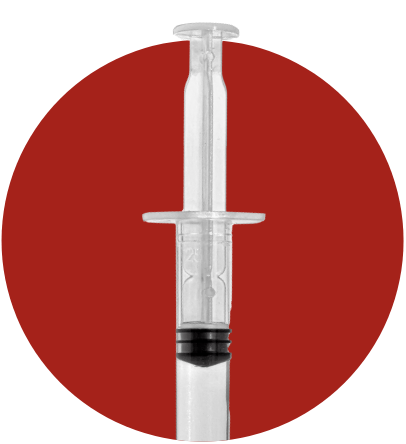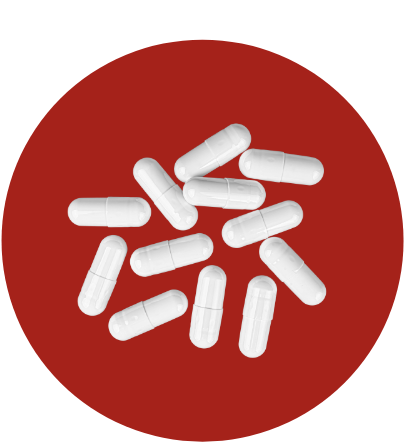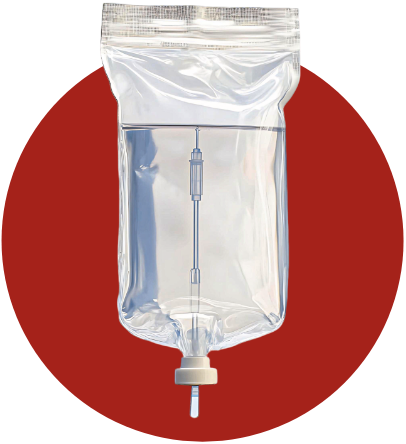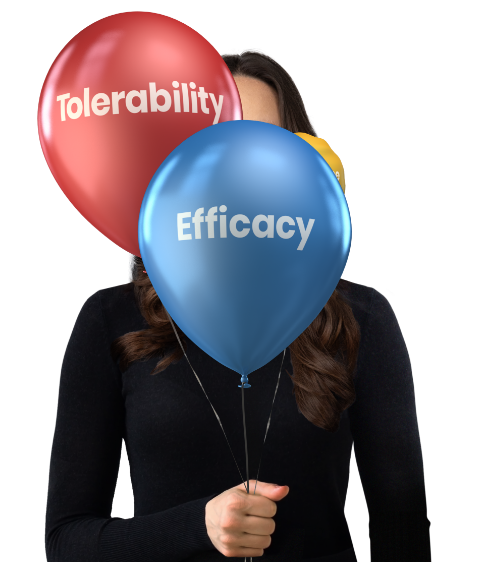Is current HAE management forcing people to make trade‑offs?
Don’t miss what’s next in
hereditary angioedema (HAE)
Life with HAE can be complicated and uncompromising.
Knowing how and when to take a medication shouldn’t be.
TRADE-OFFS WITH HAE INJECTIONS

FEAR OF NEEDLES
Needle phobia is common and may lead to delayed or avoided treatment1-3
FAMILY PLANNING
Treatment options should consider impact on personal choices in family planning4
REQUIRES TRAINING
Self-injection requires patient education and proper technique to ensure efficacy5-8
SIDE EFFECTS
May cause pain and/or a reaction at the injection site1,3,9
CUMBERSOME
May not be easily transportable1,3,10
Needle Fatigue
Long-term injectable regimens may be associated with diminished treatment adherence1,9
TRADE-OFFS WITH HAE ORALS

EFFICACY
On average, oral treatments may not provide injection‑like efficacy™12-14
MULTIPLE DOSES
On-demand treatment may require multiple doses to fully resolve an HAE attack15
SIDE EFFECTS
For prevention of attacks, currently available orals may have side effects that could lead people to discontinue therapy14,16-18
TRADE-OFFS WITH HAE INFUSIONS

TIME CONSUMING
Often require administration in a healthcare setting, delaying time to treatment19,20
HARD TO SELF‑ADMINISTER
Patients may have poor venous access and difficulty with administration20
MAY NEED OTHERS TO HELP
May require caregiver or professional support, limiting independence20
SIDE EFFECTS
May cause headaches, nausea, rash, and fever21
TRAVEL ISSUES
Equipment and storage needs can complicate treatment outside the home20

People with HAE may not be living their life to the fullest if trade‑offs get in the way1,3,22
Click a balloon or the buttons below to better understand decisions people with HAE have to make.
Real person living with HAE.




Today’s HAE management may be forcing people to choose among efficacy, tolerability, and convenience1,3,22
While efficacy is a key driver in HAE management, people also prioritize tolerability and convenience23,24
What barriers do your patients report most frequently in their HAE management?
What do your patients identify as their top priorities in managing HAE?
GET THE FACTS
HAE attacks may be triggered by injury, stress, or even excitement, but may also appear for unknown reasons25,26
The management of HAE includes two distinct therapeutic strategies: measures to prevent attacks and treatment for acute episodes12
Options that either inhibit production of bradykinin or compete with the bradykinin receptor are currently utilized27
Managing HAE is different from angioedema associated with histamine since antihistamines, corticosteroids, and epinephrine have little effect on HAE swelling28

Critical Role of Bradykinin

Living with HAE
References
- Radojicic C, et al. Allergy Asthma Proc. 2021;42(3):S4-S10.
- Riedl MA, et al. Allergy Asthma Proc. 2021;42:S17-S25.
- Betschel SD, et al. Allergy Asthma Clin Immun. 2024;20(43):1-8.
- Hsu FI, et al. Allergy Asthma Clin Immun. 2022;18(64):1-9.
- Haegarda [prescribing information]. CSL Behring GmbH. Accessed June 6, 2025. https://www.fda.gov/media/105611/download
- Takhzyro [prescribing information]. Dyax Corp. Accessed June 6, 2025. https://www.accessdata.fda.gov/drugsatfda_docs/label/2023/761090s010lbl.pdf
- Firazyr [prescribing information]. Shire Human Genetic Therapies, Inc. Accessed June 6, 2025. https://www.accessdata.fda.gov/drugsatfda_docs/label/2024/022150s016lbl.pdf
- Tuong L-AC, et al. Allergy Asthma Proc. 2014;35(3):250-254.
- Food and Drug Administration. The voice of the patient – Hereditary angioedema. Published May 2018. Accessed May 23, 2025. https://www.fda.gov/files/about%20fda/published/The-Voice-of-the-Patient—Hereditary-Angioedema.pdf
- Soteres DF, et al. Clin Case Rep. 2021;9(11):e05086.
- Data on file, Pharvaris.
- Betschel SD, et al. J Allergy Clin Immunol Pract. 2023;11(8):2315-2325.
- Geba D, et al. J Drug Assess. 2021;10(1):51-56.
- Covella B, et al. Future Pharmacol. 2024;4(1):41-53.
- Riedl MA, et al. N Engl J Med. 2024;391:32-43.
- Farkas H, et al. Clin Transl Allergy. 2021;11(4):e12035
- Wedner HJ, et al. J Allergy Clin Immunol Pract. 2021;9(6):2305-2314.e4.
- Zuraw B, et al. J Allergy Clin Immunol. 2021;148:164-172.
- Savarese L, et al. Allergy Asthma Proc. 2021;42(1):e1-e7.
- Riedl MA, et al. Ann Allergy Asthma Immunol. 2017;119(1):59-64.
- Cinryze [prescribing information]. Takeda Pharmaceuticals U.S.A., Inc. Accessed June 6, 2025. https://www.fda.gov/media/75907/download
- Lumry WR, et al. Allergy Asthma Proc. 2020;41(Suppl 1):S08-S13.
- Busse PJ, et al. J Allergy Clin Immunol Pract. 2021;9(1):132-150.
- Riedl MA, et al. Allergy. 2020;75(11):2879-2887.
- Maurer M, et al. Allergy. 2022;77(7):1961-1990.
- Aygören-Pürsün E, et al. Orphanet J Rare Dis. 2014;9(99):1-9.
- Abdulkarim A, et al. Hereditary angioedema. In: StatPearls [Internet]. Treasure Island (FL): StatPearls Publishing; 2023. Accessed June 17, 2025.
- Lima H, et al. Front Allergy. 2023;10(4):1-5.






